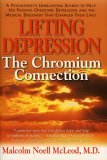Chromium: In a Nutshell
Chromium is needed by the body as it helps to regulate the blood sugar and cholesterol levels.
Chromium: In-depth
The human body contain only 1.7mg of chromium. Chromium is an essential trace element needed for carbohydrate metabolism. It also contributes to improving the effect of insulin in the blood and consequently increases glucose tolerance. The glucose passes quicker into the cells. In addition to this chromium is needed by the body to keep the cholesterol levels constant.
Requirement, deficiency, oversupply:
Recommended chromium intake according to the DGE* |
Age |
Male |
Female |
19 - 25 |
30 - 100 µg |
30 - 100 µg |
25 - 51 |
30 - 100 µg |
30 - 100 µg |
51 - 65 |
30 - 100 µg |
30 - 100 µg |
over 65 |
30 - 100 µg |
30 - 100 µg |
*Deutsche Gesellschaft für Ernährung - a German Nutrition Society.
A shortage of chromium may cause glucose intolerance and diabetes symptoms may occur. Chromium deficiencies are very rare and have only occurred with total parenteral nutrition patients (hyperalimentation).
There are two types of chromium bonds with different effects on the body if consumed in excessive amounts. Trivalent chromium found in food is hardly toxic and is only consumed in small amounts. Hexavalent chromium, on the other hand, is absorbed quickly by the body and is toxic. It has allergenic and carcinogenic (cancer causing) effects. Hexavalent chromium usually comes from industrial sources (e.g. chromium in cement).
top  |
Chromium in Foods:
Foods with reasonable amounts of chromium are meat products, brewer's yeast, cheese and whole meal products.
Chromium in 100 g Foods:
Brewer's yeast: 200 µg
Lentils: 70 µg
Whole meals bread: 49 µg
Chicken: 26 µg
Units: 1.000.000 µg = 1 g
top 

Lifting Depression: The Chromium Connection

Nancy Clark's Sports Nutrition Guidebook
Nancy Clark

The Complete Book of Food Counts, 9th Edition: The Book That Counts It All
|

